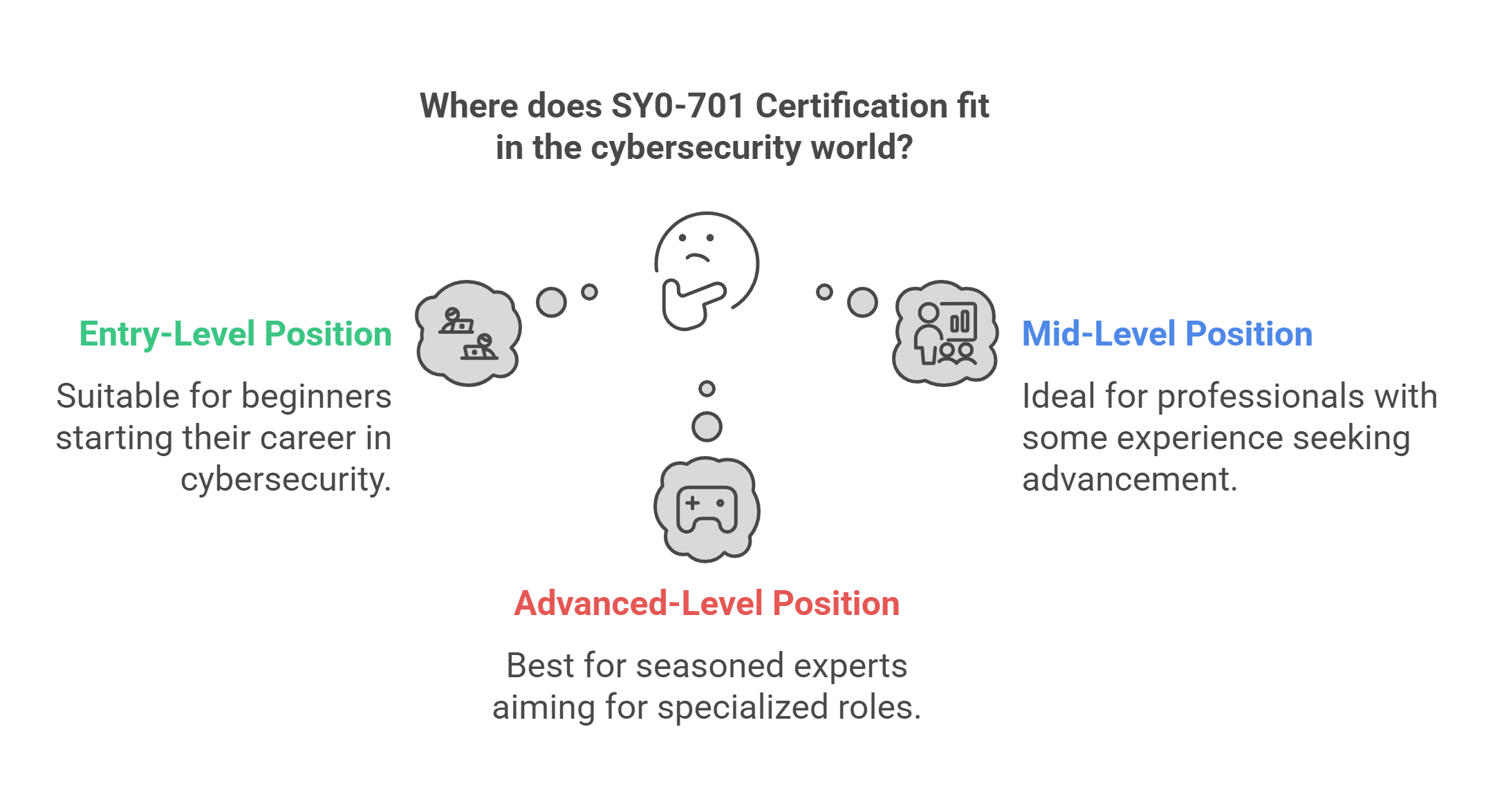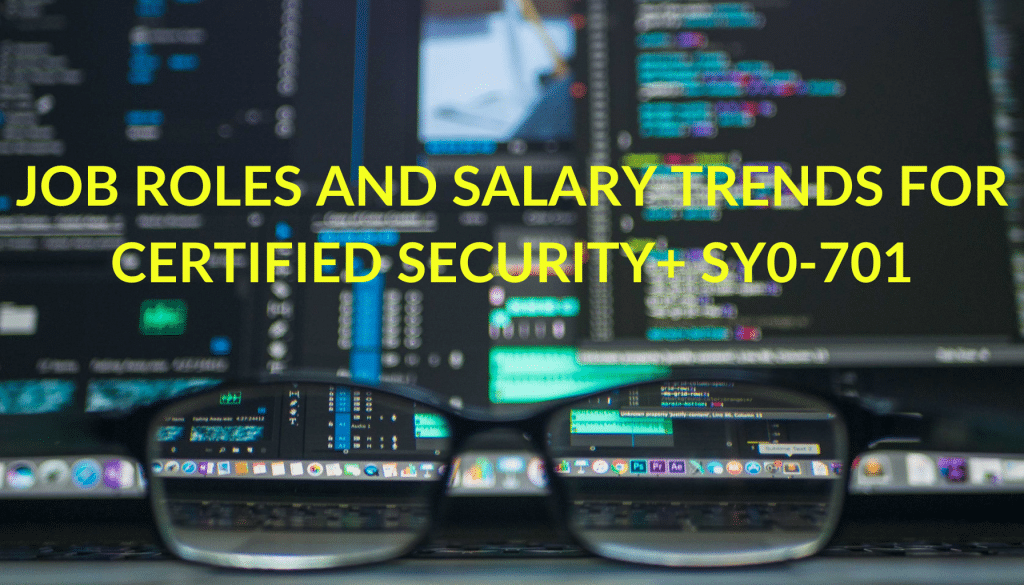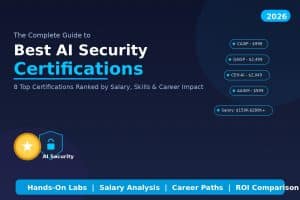Cybersecurity has become more critical than ever in a world where technology touches every aspect of our lives. The SY0-701 certification is a key credential that helps professionals stand out in the competitive cybersecurity job market. It validates essential skills and opens doors to rewarding roles like cybersecurity analyst, penetration tester, and SOC analyst.
Beyond being a resume booster, SY0-701 establishes you as a trusted expert in protecting digital systems. With the rising demand for skilled professionals, this certification offers a solid pathway to high-paying, impactful careers.
Let’s explore the job opportunities, salary trends, and benefits of being SY0-701 certified, helping you plan your next steps in the cybersecurity world.

Where Does SY0-701 Certification Fit in the Cybersecurity World?
Cybersecurity has become essential for protecting everything digital, from personal data to critical infrastructure. As cyber threats grow, organizations use security solutions and search for professionals who can safeguard their systems. The SY0-701 certification is one of the most sought-after credentials, equipping candidates with hands-on skills to combat modern cyber risks.
SY0-701-certified professionals are recognized for their ability to handle issues like DDoS attacks, ransomware, and phishing attempts, making them valuable assets in industries like finance, healthcare, and government. For a structured study approach with proven strategies, explore ultimate SY0-701 exam preparation guide to boost your chances of passing on the first attempt. Before moving on, try a free SY0-701 exam questions from Cert Empire to check your understanding.
Let’s see why this certification is crucial:
Keeping Up With Modern Threats
Cyber threats evolve daily, and businesses need professionals who can stay ahead of the curve.
SY0-701 addresses these challenges by focusing on advanced topics like threat detection, risk and vulnerability management, and security architecture and incident response, ensuring you’re prepared for real-world scenarios.
Bridging Theory and Practice
Unlike many other certifications, SY0-701 ensures that candidates are not just book-smart. It validates their ability to apply what they’ve learned in high-pressure environments, giving employers confidence in their skills.
Employer Recognition
Organizations trust SY0-701-certified professionals because the certification reflects current industry standards. It’s a reliable indicator that you’re trained to deal with today’s cyber security certification challenges, making you a preferred candidate during recruitment.
Versatile Career Opportunities
SY0-701 opens doors to various roles like cybersecurity analyst, SOC analyst, penetration tester security consultant network administrator, and security engineer. Instead of limiting you to one area, it builds a foundation that allows flexibility in choosing your career path.
Quick Recognition During Hiring
Recruiters often prioritize SY0-701 holders because it’s a trusted credential. Having this certification sets you apart and ensures you’re seen as a capable and prepared candidate.
Rising Cyber Threats = More Jobs
With cyberattacks on the rise, companies are under immense pressure to strengthen their defenses. This surge in demand is creating significant opportunities for SY0-701-certified experts.
Industries That Need You
From the security specialist healthcare to finance and government, nearly every sector is actively hiring cybersecurity professionals. Having an SY0-701 certification positions you to take advantage of these growing opportunities.
Essential and Respected Roles
SY0-701 doesn’t just lead to jobs; it leads to meaningful roles where your skills are valued. Whether your job titles protecting sensitive patient data or securing financial systems, you’ll be making an impact.
Top Cybersecurity Roles for SY0-701 Certified Professionals
Top Cybersecurity Roles & Salary Trends for SY0-701 Certified Professionals (2026)
| Role | Average Salary | Education | Certifications | Core Skills |
|---|---|---|---|---|
| Cybersecurity Analyst | $70K – $100K+ | Bachelor’s in IT/Cybersecurity (preferred) | SY0-701, CEH, CISSP (advanced) | Risk assessment, SIEM tools, log analysis, communication |
| Penetration Tester (Ethical Hacker) | $80K – $120K+ | Degree in Cybersecurity/IT or equivalent experience | SY0-701, OSCP, CEH | Vulnerability assessment, Metasploit, Nmap, Burp Suite |
| SOC Analyst | $60K – $100K | Bachelor’s in Cybersecurity/CS | SY0-701, CySA+, CEH | Threat monitoring, incident response, teamwork, SIEM |
| Security Engineer | $90K – $130K+ | Bachelor’s/Master’s in Cybersecurity or Network Engineering | SY0-701, CISSP, CISM | Secure architecture, firewalls, encryption, vulnerability management |
| GRC Specialist | $75K – $110K | Bachelor’s in Business, IS, or Cybersecurity | SY0-701, CRISC, CISA | Policy creation, compliance, audits, risk assessment |
The SY0-701 certification opens doors to numerous career opportunities in cybersecurity. With the increasing importance of securing digital infrastructure, professionals equipped with this credential can step into roles that match their skills and interests.
Let’s explore some of the top roles for SY0-701-certified individuals and what each entails.
1- Cybersecurity Analyst: The Backbone of Digital Defense
Cybersecurity analysts are the first line of defense against cyber threats. They proactively monitor systems, analyze logs, and patch vulnerabilities to prevent attacks. Their job is critical because they react to threats and predict potential risks, ensuring systems are secure. Analysts collaborate with teams to train employees on various security principles and best practices while using tools like SIEM systems, firewalls, and antivirus software.
Salary: Entry-level starts at $70,000; senior roles exceed $100,000 annually.
Education: Bachelor’s degree in Computer Science, Information Technology, or a related field is preferred.
Certifications: CompTIA Security+ (SY0-701), Certified Ethical Hacker (CEH), CISSP for advanced roles.
Skills Required: Risk assessment, log analysis, system monitoring, and communication.
2- Penetration Tester: Cracking Systems to Secure Them
Penetration testers, or ethical hackers, think like cybercriminals to expose system vulnerabilities legally. They use specialized security tools both to exploit weaknesses and document findings for organizations to fix. This dynamic role often involves testing websites, simulating phishing attacks, and working with tools like Metasploit, Nmap, and Burp Suite. Pen testers also communicate their findings to stakeholders, bridging technical insights with business priorities.
Salary: Entry-level starts at $80,000; experienced testers earn $120,000 or more.
Education: Degree in Cybersecurity, IT, or related fields. Some roles accept equivalent experience.
Certifications: CompTIA Security+ (SY0-701), OSCP, CEH.
Skills Required: Hacking methodologies, vulnerability assessment, penetration testing tools, and report writing.
3- SOC Analyst: Monitoring Threats Around the Clock
A SOC (Security Operations Center) analyst works in a high-pressure environment, constantly monitoring networks for anomalies and threats. They’re responsible for detecting, analyzing, and responding to cyber security incidents, in real time. SOC analysts use advanced monitoring tools and act quickly to minimize damage, making this a fast-paced and rewarding career.
Salary: Entry-level starts at $60,000; senior SOC analysts earn up to $100,000 or more.
Education: Bachelor’s degree in Cybersecurity, IT, or Computer Science.
Certifications: CompTIA Security+ (SY0-701), CySA+, CEH.
Skills Required: Threat detection, log analysis, incident response, and teamwork.
4- Security Engineer: Designing Cyber Defense Systems
Security engineers focus on core security functions building and maintaining secure systems that can withstand attacks. They design network architectures, make systems administrator configure firewalls, and implement encryption to protect sensitive data. This role requires staying updated on emerging technologies to ensure defenses remain robust. Security engineers play a strategic role in fortifying an organization’s cybersecurity posture.
Salary: Entry-level starts at $90,000; experienced engineers can earn $130,000 or more.
Education: Bachelor’s or Master’s degree in Cybersecurity, Network Engineering, or a related field.
Certifications: CompTIA Security+ (SY0-701), CISSP, CISM.
Skills Required: Secure network design, encryption, vulnerability assessment, and technology evaluation.
5- GRC Specialist: Balancing Governance, Risk, and Compliance
Governance, Risk, and Compliance (GRC) specialists ensure organizations meet regulatory standards and manage cybersecurity risks effectively. They draft policies, conduct audits, and implement risk management frameworks.
While less technical than other roles in cyber security manager, GRC is vital in many security related issues preventing legal and financial penalties by aligning cybersecurity practices with industry standards.
Salary: Ranges from $75,000 to $110,000, depending on experience and industry.
Education: Bachelor’s degree in Business, Cybersecurity, or Information Systems. Certifications: CompTIA Security+ (SY0-701), CRISC, CISA.
Skills Required: Policy development, risk assessment, compliance management, and communication.
To get a detailed breakdown of objectives, domains, and exam format, check out this CompTIA SY0-701 exam guide.

Who’s Paying the Most? Exploring High-Paying SY0-701 Job Roles
Companies across industries are desperate for skilled security professionals who can safeguard their systems. But where’s the money really at?
Let’s dig into which roles, industries, and sectors are throwing the most money on the table.
Roles with Six-Figure Salaries for Certified Cybersecurity Professionals
If you’re aiming for that sweet six-figure paycheck, certain cybersecurity roles stand out. Penetration testers, often called ethical hackers, can easily rake in $120K or more annually. They’re hired to think like hackers but work for the good guys, poking holes in systems to make them stronger.
Another high-paying role is the network security, engineer. These are the folks designing and building secure networks. Starting salaries hover around $90K, but experienced engineers easily surpass the six-figure mark.
SOC analysts and GRC specialists might not sound as flashy, but they still offer solid pay. Senior SOC analysts, who keep a constant eye on potential threats, can touch six figures with enough experience.
Meanwhile, GRC specialists, balancing compliance with cybersecurity, often see salaries climbing to $110K in sectors with heavy regulations.
Industries Offering the Most Lucrative Cybersecurity Packages
When it comes to industries, the financial sector is a clear leader in doling out fat paychecks. Banks and investment firms don’t take risks with data breaches, and they’re willing to pay top dollar for cybersecurity pros who keep their systems locked down.
Tech companies, especially cloud service providers, are another goldmine. They’re always on the hunt for certified professionals software developers who can secure their platforms and data.
Healthcare isn’t far behind. With sensitive patient data at stake, hospitals and pharmaceutical companies are opening their wallets to hire the best.
Then there’s the energy sector, where protecting critical infrastructure from cyber threats is a top priority.
If you’re considering whether to pursue a governance-focused certification instead, our SY0-701 vs CISM certification comparison highlights the key differences.
Government vs. Private Sector: Who Offers Better Compensation for SY0-701 Experts?
The age-old debate: government jobs or private sector roles? Both have their perks, but where you land might depend on what you value more.
The private sector, especially tech giants and financial institutions, generally offers higher starting salaries.
You could easily see $100K+ right out of the gate if you play your cards right.
Government roles, on the other hand, might not always match the private sector in raw numbers, but they make up for it in stability and benefits.
Working in defense or federal agencies, for example, often comes with perks like pensions, job security, and opportunities to work on high-stakes projects that make a real difference.
And let’s not forget the prestige that comes with securing national assets.
For a deeper comparison with advanced-level certifications, read our detailed SY0-701 vs CISSP guide.
Salary Trends in Cybersecurity: Insights for SY0-701 Certified Pros
Cybersecurity salaries have been skyrocketing over the years, and it’s no coincidence. With cyber threats growing more sophisticated, companies are willing to shell out serious cash to secure their systems.
If you’re SY0-701 certified, you’re sitting in a great spot to tap into this trend.
But where exactly does your cert put you in the salary landscape? Let’s break it down.
Average Salary Ranges Across Popular Cybersecurity Roles
When it comes to pay, cybersecurity jobs vary widely depending on the role and experience level. Here’s a snapshot of what you can expect:
Cybersecurity Analyst: These pros kick off with salaries around $70K at entry level. With a few years of experience, you can move up to $100K+ pretty easily. Analysts are vital because they don’t just watch for threats—they figure out ways to block them before they hit.
Penetration Tester: Love ethical hacking? Pen testers, who legally try to break into systems to find vulnerabilities, can start at $80K. Experienced testers often make $120K or more.
Security Engineer: Designing the computer systems administrators and that protect organizations from attacks is no small job. Entry-level engineers typically earn $90K, but with time, salaries can climb past $130K.
SOC Analyst: Watching over networks 24/7 can be intense, but it pays off. Starting salaries are $60K-$70K, while senior SOC analysts pull in six figures.
GRC Specialist: If rules, compliance, and audits are your thing, this is the job for you. These specialists make $75K-$110K, depending on experience and industry.
Regional Salary Variations: Where to Move for Higher Pay
Not all regions pay the same for cybersecurity roles. In the U.S., cities like San Francisco, New York, and Washington D.C. lead the pack in offering top-dollar salaries.
For instance, a top security analyst or engineer in the Bay Area might start at $110K, compared to $80K in smaller cities.
In Europe, London is a hotbed for cybersecurity talent, with salaries averaging around £60,000 for mid-level roles. Germany is catching up fast, especially in tech hubs like Berlin and Munich.
Meanwhile, in Asia, Singapore and Tokyo are the standout cities. Companies here often pay a premium because of the growing demand for experienced cybersecurity professionals in finance and tech sectors.
How to Land Top Cybersecurity Roles with SY0-701?
If you’re serious about breaking into cybersecurity or leveling up your current gig, SY0-701 is a game-changer. The cert itself is a great start, but landing top roles takes more than just passing the test.
You’ll need a mix of skills, strategies, and a little hustle.
Let’s get into what works.
Essential Skills Employers Seek in SY0-701 Candidates
Having SY0-701 certs on your resume shows you’ve got foundational knowledge, but what really catches an employer’s eye are the skills that show you can put that knowledge into action.
Here’s what recruiters love to see:
Hands-on Experience: If you’ve worked with firewalls, threat and intrusion detection systems, or network protocols, make sure that’s front and center. Employers want people who know what they’re doing, not just textbook learners.
Incident Response: Knowing how to handle a security breach fast is critical. If you can detail a time when you successfully mitigated a threat, that’s gold.
Risk Assessment: Companies like candidates who understand how to do security program management assess vulnerabilities and suggest fixes. It’s about more than just spotting the issue; it’s showing you can solve it.
Communication: Cybersecurity pros aren’t always sitting behind a computer—they often need to explain issues to people who don’t understand tech. Can you break down cybersecurity threats into plain English for non-techies?
Cert Stacking: SY0-701 is great, but pairing it with something like CEH, CISSP, or a cloud cert (AWS, Azure) can really set you apart.
Exam Dumps by Cert Empire for Passing the Exam
Passing SY0-701 isn’t a walk in the park, but it’s manageable if you’ve got the right resources. One of the best tools in your arsenal is a reliable exam dump. That’s where Cert Empire comes in.
Cert Empire offers dumps that don’t just help you memorize answers—they explain why those answers are correct.
This is crucial for actually understanding the material and not just passing the exam. Their dumps cover real exam scenarios, so you’re prepared for the tricky questions that might throw others off.
You can check more about SY0-701 Exam Dump here: https://certempire.com/exam/sy0-701-pdf-dumps/
Final Thoughts: Building a Rewarding Career with SY0-701!
SY0-701 isn’t just another line on your resume—it’s a gateway to opportunities. The skills you pick up during prep and the credibility you gain after passing can set you on a path toward roles that matter.
Employers value the certification because it shows you’ve got the basics down, and they know they can build on that foundation.
Preparation is key to making the most of your SY0-701 certification, and having a well-structured study approach can greatly improve your chances of success. From understanding exam objectives to mastering test-taking strategies, the right guidance can help you confidently tackle the exam. Exploring effective preparation methods ensures you’re not just passing the test but truly grasping the core cybersecurity concepts that employers value.
FAQs
What is the average salary for an SY0-701 certified professional?
Salaries range from $65,000 for entry-level roles to over $100,000 for experienced professionals.
Which industries are hiring the most SY0-701 certified professionals?
Finance, healthcare, tech, and government sectors are actively hiring.
Do I need additional certifications along with SY0-701?
Certs like CISSP, CEH, or cloud-specific ones can boost your cybersecurity career prospects.
Can SY0-701 help me land a remote cybersecurity job?
Yes, remote cybersecurity roles like SOC analysts and incident responders are in demand.
How does SY0-701 compare to other cybersecurity certifications?
It’s entry-level, ideal for beginners, and complements advanced certs like CISSP or CEH.


























